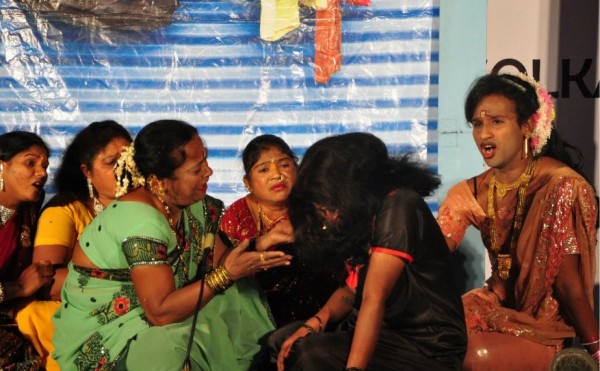
Sitting in a warm room in Phnom Penh with several other women from the Asia Pacific region, Kamalabai Pani, a sex worker and a board member of Veshya Anyay Mukti Parishad (VAMP, Prostitutes’ Collective Against Injustice) in India, became visibly upset when discussion turned to the efforts of U.S.-led feminist groups to discredit several United Nations bodies’ recommendations to decriminalize sex work in support of HIV prevention. These recommendations have been welcomed by sex worker-led groups as they believe criminalization endangers not only condom use but their very livelihoods.
In their writings and speeches, Western feminist groups have used the tactic of labeling sex worker collectives—essentially a form of trade union—as “promoters of prostitution” and “traffickers.” This lack of logic infuriates sex worker union advocates and the impact on sex workers’ lives is far more severe.
A warm woman with a demeanor of quiet strength, Pani spoke with anger recalling the raid on the VAMP community on May 20th, 2005. “These guys came to our brothel area and gave out contraceptives and sweets. Then they asked us details about the girls, how much they studied and things like that. The next day, a Friday, then came the police. There were about 40 people in plain clothes, 20-30 police in six vehicles that came to the red light area of Gokulnagar. They blocked off about five lanes and the houses. They did not ask us anything, they just came in.”
This raid came on the heels of VAMP’s sister organization Sampada Grameen Mahila Sanstha (SANGRAM) turning down funds from USAID. SANGRAM has provided technical support to the VAMP sex worker community since 1992 and the collaboration had greatly reduced HIV rates, providing antiretroviral treatment to ill workers. The organization was listed as a best practice model by USAID. However, when the U.S. emergency response to HIV/AIDS, The President’s Emergency Plan For AIDS Relief (PEPFAR), required organizations receiving funds to sign a pledge stating that they did not support prostitution, including activities like distributing condoms in that definition, Meena Seshu, founder of SANGRAM, decided it was best to return the funds. Previously lauded for her work, suddenly she found herself a target of anti-trafficking groups in the U.S.
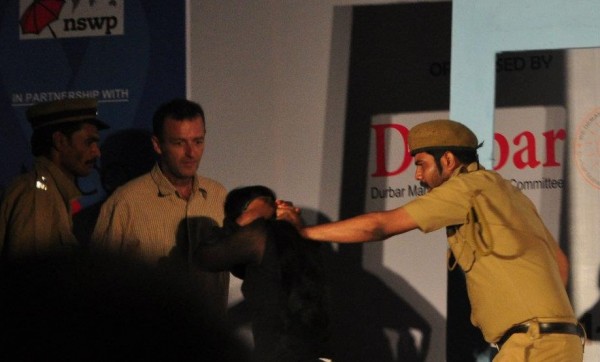
Her trials, while great, were less harsh than what sex workers faced. “The police asked the women ‘Are you a sex worker?’ If the women said yes, then they dragged her off by the hair. So the women were beaten and dragged to the vans. Some fell into the gutters,” said Pani.
This is common, according to the Global Alliance Against Traffic in Women (GAATW), which documents the impacts that anti-trafficking measures have had on sex workers around the world. According to their 2006 report on India, entitled Collateral Damage, sex workers are routinely beaten by police when arrested during raids.
“All in all 30 women, four girls and 13 brothel owners were picked up and dumped into vans. None of the 30 [were] minors. All of them were adult women. So we insisted they were adults. We told them [the police], they have a right to be in sex work but they didn’t listen. Out of the four girls, two were school-going children who had come home for summer holidays and two girls were pregnant,” said Pani
“Madams with condoms were accused of trafficking. Some condoms are left with the madam for better HIV prevention if she holds them when negotiating with the client,” she said. “We explained the condoms were for HIV prevention, the brand is the government issued free condom – Nirodh, but they were picked up for ‘forcing women into prostitution.'”
The raid was timed during a school holiday. “It was May and the schools were on vacation, so two children were at home with their mothers when the mothers were taken” she added.
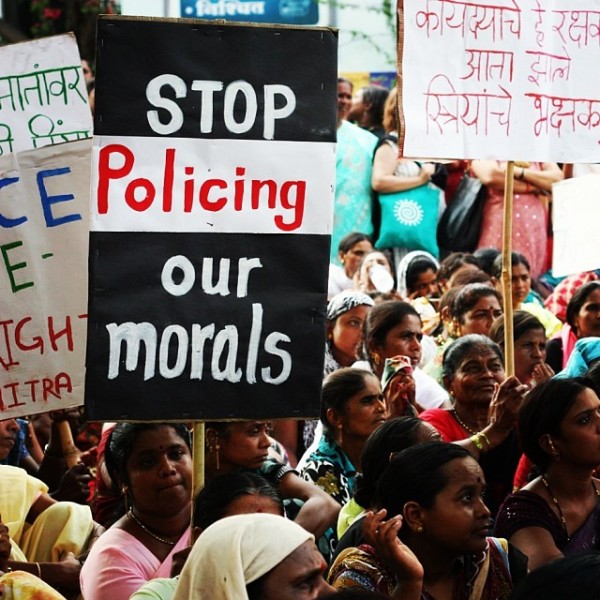
After the raid, the VAMP community had a battle on their hands releasing those detained. “The police kept two kids, for ten days. We tried to have teachers intervene so they could be released. The kids [once released] were traumatized, refusing to return to school,” Pani said.
As for the adults, “The 30 women were held for a month. The 13 madams were held 13 days.” Seshu provided background for the length of the detention: The police doubted the documentation submitted showing the majority of the girls were 18 and over, despite records proving they had completed school. Police forced them to undergo a second medical evaluation, stalling their release.
In the end, two of the girls detained were underage and pregnant, but they were eventually released due to illness. Their age and condition resulted in a smear campaign launched against SANGRAM. The Hindustan Times published a report on September 29, 2005 claiming that USAID had terminated funding to SANGRAM because they were traffickers and had tried to “thwart rescue efforts.”
Seshu sees raids and rescues as counter-productive to human rights, as they deny the agency of sex workers. From her previous successes working on other labor rights projects, she found community-led changes were the most effective at empowering both women and girls so they could make their own choices rather than have an ideology imposed on them.
To explain their position, SANGRAM released a statement: “Every brothel in Sangli had a minor when SANGRAM started work in 1990; today, very few brothels have minors. How has this happened? Through time, trust, and community involvement. Not through police raids, indiscriminate arrests, and physical violence.”
The U.S. Embassy in New Delhi released a letter on October 6th, 2005, that said funding was terminated by “mutual consent” on the part of SANGRAM and USAID. The letter went on to explain “In reference to the article that appeared September 29, 2005 on the website HindustanTimes.com, I would like to clarify that the article does not reflect the position of the United States Government regarding SANGRAM.” The letter was signed by David Kennedy, U.S. Embassy Spokesperson.

The raid against VAMP was initiated by the U.S.-based organization Restore International, a Christian NGO under the leadership of Greg Malstead. Malstead, undeterred, continued to harass the sex worker community. During the raid in May, he had frightened and angered women by kicking open the doors to their homes to gain entrance, and as a result, they had pushed for charges to be filed against him. He returned again in June of that year, loitering in the area and alarming the community.
On October 22, 2005, he came back to the community once again, in an SUV with two other men, perhaps to initiate a raid without the support of the police. From the community’s perspective, he was a white man trying to dominate and threaten them, so they fought back.
Seshu was called in to stop Malstead from getting beaten up. Before she had arrived, several members of the VAMP community had stepped in trying to protect him from the rage of the neighborhood, which saw its actions as self-defense. Malstead was escorted away by police and, interestingly enough, did not press charges against his “attackers.”
While raids and rescues such as Malstead’s are marketed as a means to protect women from sexual exploitation, GAATW found that such measures are more often used to restrict and control marginalized people of different ethnicities and lower classes from impacting more mainstream populations. The VAMP community includes some of the controversial devadasi women, members of an occupational class of traditional temple functionaries, artists, and dancers. Devadasi are often assumed to be prostitutes, but while some devadasi do engage in sex work, sex work is not an inherent part of the devadasi’s job description. Prior to working with sex workers, Seshu said she had felt that the devadasi sex workers were being exploited. In time she changed her perspective. “I couldn’t get them to share stories of misery. They didn’t want to tell me that and as a feminist I had to respect that they knew what was best for themselves. Feminists use the victim narrative,” added Seshu, who preferred to see the devadasi as capable of making their own decisions.
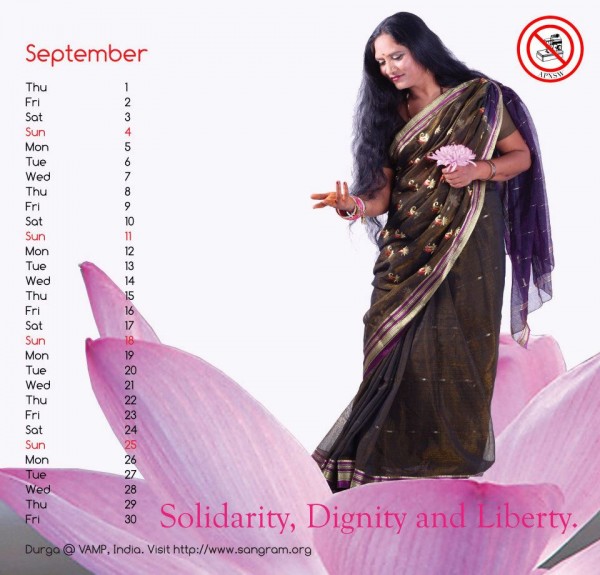
Now in 2013, Pani, who is herself a devadasi, has words to pass on to the Western feminists who urge the U.N. to support the Nordic Model globally, which calls for criminalizing clients of sex workers instead of decriminalization. “If you shut the very clients who give us our sustenance, what we eat, tomorrow you are going to start arresting our children and calling them clients? The point is, how will you decide who is the client? Will this not increase HIV? Because this will push sex workers underground because they won’t have the power to negotiate anymore and condom use will go down. The contract itself [between the sex worker and the client] will become riskier. The point is, you are moving it out of a safe space and pushing it underground.”
The Association of Women’s Rights in Development (AWID), wrote The VAMP/SANGRAM Sex Worker’s Movement in India’s Southwest, detailing how India’s anti-trafficking laws were drafted while the country was colonized under British rule, which sought to control sex workers. The report highlighted how SANGRAM and VAMP’s project aspires to break away from this colonial influence. India is grappling with another legacy from its colonial period: the criminalization of consensual same-sex activities. While this draconian law was revoked in 2009, the courts of India overturned it last week. VAMP also represents transgender and gay and bisexual sex workers. Women and men from VAMP and SANGRAM would like India to move forward without these influences from its colonial past, be they constitutional history or Western groups seeking to impose their views.
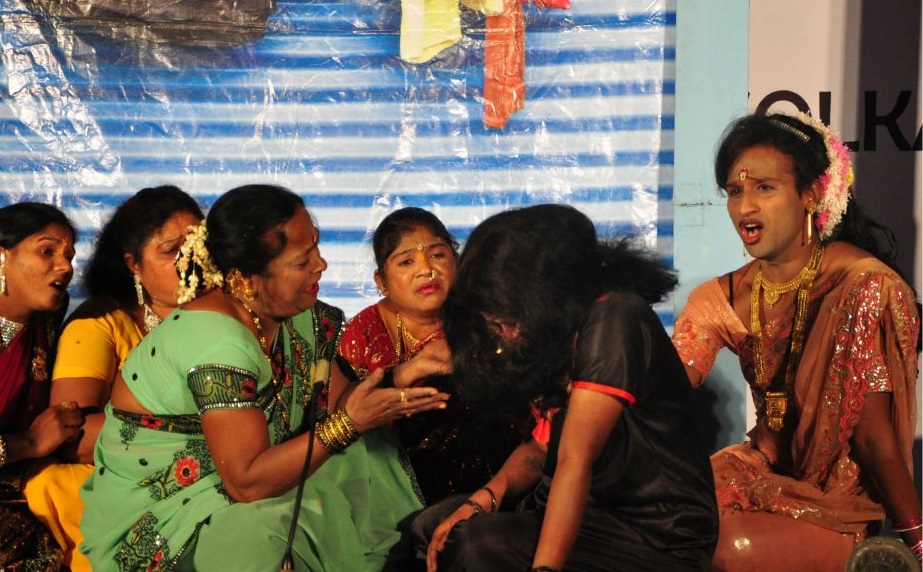
This is such an amazing article- it captures the struggles of sex workers in Asia on so many fronts- and ties them into the real cause of the problems- Imperialism, colonial legacy and saviours- be they Christian fundamentalists or feminists preaching abolition and the Swedish Model.
VAMP is a huge inspiration to sex worker groups across Asia Pacific, and beyond- as they work with ASWA to train and mentor the establishment of the new Sex Workers Training Academy in Kenya..
I LOVE LOVE LOVE this article.
What i love about VAMP though is how they have moved beyond the forced/free binary. Controversially they do not oppose the Devadasi system- they oppose exploitation of Devadasi women and demand respect for their role in the religion. And also they have put out a manifesto very early one which included the voices and demands of sex workers that outsiders (or free/forced binarists) would call trafficking victims. And these were not demands for rescue they were demands for respect, workers rights and to be free of police violence arrest and abuse and to focus on letting the community take care of minors in the industry and for the community to work together to end child labour in the sex industry- not through a moral lens but through a practice that recognised the rights of young people and demanded labour rights for sex workers, and started the building of strong bridges with the feminist movement in India and abroad.
And of course the success VAMP is a testament to the most amazing feminist activist I know- Meena Seshu who gave sex workers the information and skills to organise and do all this themselves. We need more Meena Seshus, less Gloria Steinams and no more Janice Raymonds…
Andrew, what is the Sex Workers Training Academy in Kenya, and would anyone in APNSW like to write about it for us?
I also highly recommend that readers click on the paper we linked in the devadasi paragraph–I learned a lot from it. We’d preferred to have something written by devadasi VAMP members themselves, but we couldn’t find anything on short notice.
Maybe you can answer this question for me, Andrew–why do people disapprove of the devadasi system?
It’s complicated. Most people disapprove of it on many grounds. The main ground everyone sort of frowns upon is the dedicating of the girls to the God and temple when they are underage- and then them doing sex work underage.
But that doesn’t mean the whole system needs to be disbanded. Like many religious traditions it needs respectful reform, and reform led by those who are part of it. It doesn’t need to be destroyed by some state-feminist alliance as some ultimate embodiment of evil.
I’m not religious at all- but i do see the social function that religious orders play- like the Buddhist monkhood providing education and housing for so many young boys whose families would be too poor to feed and educate them otherwise. No one is demanding the disbanding of the monkshood because there is sexual abuse of young novices by some monks, and no one is demanding the end of the Catholic Church because of the child abuse scandals.
So thinking about it now I think it’s the hatred and misunderstanding of sex work, and plain, simple misogyny. The Devadasi System provides food and shelter and more for poor young women. But because it often involves sex work and it’s for women it is condemned.
A few years ago VICE magazine made a film on the Devadasi system called Prostitutes of God. It was really disgusting. VAMP members helped them and got totally fucked over. The film even disclosed the HIV status of one young Devadasi woman.
Vamp made a short video response that is really worth watching- inly 3 minutes long but has Devadasi women speaking for themselves.
the link is here: http://youtu.be/16OGyssJTvo
Glad you mentioned the movie kerfuffle and linked to it–Parker had a few sentences about it in the rough draft of this piece but it was ultimately too tangential. Also, thanks for all this info!
Thank you Andrew for your support in reaching out to sex worker communities around the Asia Pacific. You are a true friend to sex worker communities and your bright soul is irreplaceable.
A few years ago VICE magazine made a horrible sensational film about Devadasis, with the help of Devadasis from VAMP. It was called Prostitutes of God.
Devadasis, and their children made a short video response- it is brilliant… The final line is absolute gold…
Well written! I love and applaud the style and the clarity of the article. the devadasi system is a system followed by followers of Goddess Renuka, in the North Karnataka region of Western India. The British decided its a debased system and with the help of Indian reformers banned the system and criminalised its followers. In the system girl children were dedicated to the goddess and were `married’ to her. This meant they could never be married to a human and thus such girls remained `unmarried to a man’ and so `available’ to anyone who paid for them. Invariably, this meant men who were rich and of the upper caste. Leaders form the `Dalit’ [ lowest in the caste hierarchy] struggles fought against this system as another arm of the oppression from the `upper’ castes. Though criminalized the system still exists in the underground.
Women in sex work from VAMP who are part of the devadasi system argue that it is a system that gave them economic independence from men and since they were never `married off’ a equal share in the family property as their brothers. In effect they became a `man’ in the family, in many cases heads of households.They were responsible for the family, and earned money from exchange of sexual services. This was and is deemed debased by Indian State and society and thus the devadasis are `forced’ to rehabilitate and give up the system. Women protest that the economic independence the system gave them is now denied to them changing the relationships they shared within the family, lowering their status in the community and in the family. In history, devadasis shared power and privilege – but today they are reduced to being hounded by state, male family members politicized by the Dalit struggles and `do gooders’ who are part of the state progrom.
I’m really glad you like the article, Meena, and thank you for all this background! By the way, we’d really love it if we at Tits and Sass could interview you directly in an Activist Spotlight interview at some pt–you’re such an incredible role model as a sex workers’ rights advocate. Not that Parker didn’t do an incredible job in this piece and in “Equality Now, Or Else?” documenting her interviews with you.